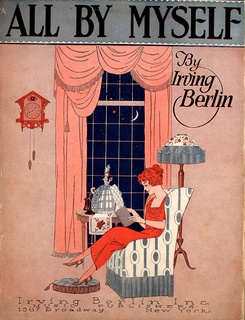Related Research Articles
"Heat Wave" is a popular song written by Irving Berlin for the 1933 musical As Thousands Cheer, and introduced in the show by Ethel Waters.
"All Through the Night" is a 1934 popular song written by Cole Porter for his 1934 musical Anything Goes. The melody's distinguishing characteristic is a descending chromatic scale, starting on the third, interrupted by an octave leap after four bars. It was introduced by William Gaxton and Betina Hume. Hit versions in 1935 were recorded by Paul Whiteman and by Harry Rosenthal.
For other songs with this title, see Goodnight My Love (disambiguation)
"I've Got My Love to Keep Me Warm" is a popular song written in 1937 by Irving Berlin and introduced in the film On the Avenue when it was sung by Dick Powell and Alice Faye.
"You're Laughing at Me" is a popular song written by Irving Berlin for the 1937 film On the Avenue, where it was introduced by Dick Powell. Popular versions in 1937 were by Fats Waller and by Wayne King.
"I Used to Be Color Blind" is a popular song written by Irving Berlin for the 1938 film Carefree, where it was introduced by Fred Astaire. The Astaire recording was very popular in 1938.
"I'm Putting All My Eggs in One Basket" is a popular song written by Irving Berlin for the 1936 film Follow the Fleet, where it was introduced by Fred Astaire and Ginger Rogers. Astaire had a huge hit with the song in 1936 and other popular versions that year were by Jan Garber and by Guy Lombardo.
"Isn't This a Lovely Day?" is a popular song written by Irving Berlin for the 1935 film Top Hat, where it was introduced by Fred Astaire in the scene where his and Ginger Rogers' characters are caught in a gazebo during a rainstorm. The lyric is an example of a song which turns a bad situation into a love song, a common style for Irving Berlin, as in I've Got My Love to Keep Me Warm and Let's Have Another Cup of Coffee.
"Now It Can Be Told" is a popular song written by Irving Berlin for the 1938 film Alexander's Ragtime Band, where it was introduced by Alice Faye and Don Ameche. It was nominated for an Academy Award in 1938 but lost out to "Thanks for the Memory".
"How About Me?" is a popular song written by Irving Berlin in 1928. The song is an expression of sorrow over a love affair that is over. The first recording by Fred Waring's Pennsylvanians was popular in 1928 and the song has subsequently been recorded by many artists.
"The Song is Ended " is a popular song composed by Irving Berlin in 1927. Early hits in 1928 were by Ruth Etting and by Whispering Jack Smith. In 1948, Nellie Lutcher and Her Rhythm briefly charted with the song.
"You Keep Coming Back Like a Song" is a popular song written by Irving Berlin for the 1946 film Blue Skies, where it was introduced by Bing Crosby. The song was nominated for "Best Song" in 1946 but lost out to "On the Atchison, Topeka and the Santa Fe". Dinah Shore's version was biggest in the US reaching the No. 5 spot, while Crosby's version peaked at No. 12. Jo Stafford also had chart success with it and her version achieved the No.11 position.
"Reaching for the Moon" is a popular song written by Irving Berlin for the 1930 musical film of the same name.
"Do I Love You?" is a 1939 popular song written by Cole Porter, for his musical Du Barry Was a Lady, where it was introduced by Ronald Graham and Ethel Merman.
"Lazy" is a popular song written by Irving Berlin in 1924. Popular recordings of the song in 1924 were by Al Jolson, Blossom Seeley, Paul Whiteman and the Brox Sisters. The best known version today may be that performed by Marilyn Monroe, Donald O'Connor, and Mitzi Gaynor in the motion picture There's No Business Like Show Business.
"Johnny One Note" is a 1937 show tune from the 1937 Rodgers and Hart musical Babes in Arms, where it was introduced by Wynn Murray. Judy Garland sang it in the Rodgers & Hart biopic Words and Music (1948).
"Mean to Me" is a popular song with music by Fred E. Ahlert and lyrics by Roy Turk, published in 1929. Hit versions that year were by Ruth Etting and by Helen Morgan. Ben Bernie and the Hotel Roosevelt Orchestra also recorded what might be the first male version in February 1929 with vocals by Scrappy Albert.

"All by Myself" is a popular song written by Irving Berlin, published in 1921.
"This Year's Kisses" is a popular song written in 1936 by Irving Berlin for the musical film On the Avenue (1937) and introduced by Alice Faye. Popular recordings in 1937 were by Benny Goodman, Hal Kemp, Shep Fields and by Teddy Wilson with Billie Holiday.
"I Never Had A Chance" is a popular song written by Irving Berlin, published in 1934. Popular versions that year were by Eddy Duchin and by Glen Gray & The Casa Loma Orchestra.
References
- ↑ Whitburn, Joel (1986). Joel Whitburn's Pop Memories 1890-1954. Menomonee Falls, Wisconsin: Record Research Inc. p. 580. ISBN 0-89820-083-0.
- ↑ "Discogs.com". Discogs.com. Retrieved March 30, 2020.